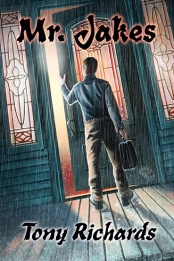
Tony Richards
Dark Renaissance Books
October 2015
Reviewed by Michael R. Collings
Alex Morland is an author with one bestseller to his credit—and three subsequent novels that went nowhere. Now he is determined to recreate the atmosphere that led to his first novel. To do so, he has traveled to a small coastal town in southern England where he can find the isolation he desires … and the sea view his imagination demands.
Unfortunately, all of the hotels in Birchiam, Sussex, are closed for the season. Then, just before he returns to the highway and leaves Birchiam behind, he spots it. A darkened lane, the angles of a Gothic rooftop, and a sign directing him to “Guest Parking.” He has arrived at The Grange.
Richards aptly sets the mood for his haunted house novella, the first in Dark Renaissance Books’ Haunted House Series. Everything is present: the dark and stormy night, the outwardly deserted village on a rural byway, the Gothic mansion (beautifully captured in a moody colored illustration by M. Wayne Miller, facing page one). And inside the mansion, a perfectly appointed, Victorian-era hotel staffed by an unusually and perfectly accommodating young woman, who directs him to the perfect room.
Everything about The Grange seems perfect.
Except … well, there are the sounds of footfall, of a child running up and down the hall. Climaxing in a scream. The distraught woman in the garden. The dreams — especially the one featuring a shadow that somehow knows more about Morland than it should.
And finally, there is the bill. Nothing in the Grange is free, and eventually Morland must face the reckoning. And the horror.
Using time-honored elements of traditional ghost stories, with just the slightest touches of something nearly Lovecraftian in a mysterious portal through time (also captured in a color illustration) and an admixture of the mythologies surrounding Jack the Ripper and Springheel Jack, Richards crafts a taut, eerily realized tale of obsession and possession of what one writer is willing to sacrifice in order to succeed and what it eventually costs him. As a novella, the story works ideally. Any shorter, and it would feel rushed, the opposite of the sense of timelessness within the Grange that is central to it effectiveness. Any longer, and it would become repetitive and tedious.
As it stands, Mr. Jakes is an evocative and appropriately creepy excursion into the supernatural, well written, well imagined, and well executed.
- Killing Time – Book Review - February 6, 2018
- The Cthulhu Casebooks: Sherlock Holmes and the Miskatonic Monstrosities – Book Review - January 19, 2018
- The Best Horror of the Year, Volume Nine – Book Review - December 19, 2017
- Widow’s Point – Book Review - December 14, 2017
- Sharkantula – Book Review - November 8, 2017
- Cthulhu Deep Down Under – Book Review - October 31, 2017
- When the Night Owl Screams – Book Review - October 30, 2017
- Leviathan: Ghost Rig – Book Review - September 29, 2017
- Cthulhu Blues – Book Review - September 20, 2017
- Snaked: Deep Sea Rising – Book Review - September 4, 2017


